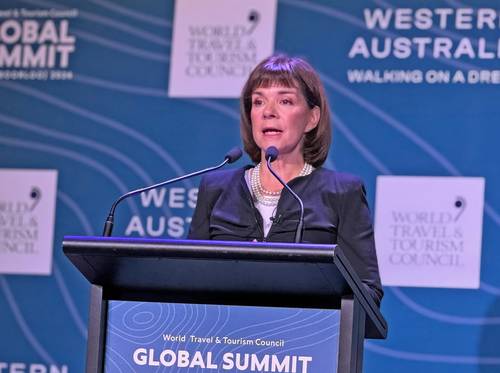▲ Julia Simpson, president of the World Travel and Tourism Council, during the opening of the meeting of that body in Perth, Australia.Photo Roberto González Amador
Perth. One tenth of the value of the world economy depends on tourism. The sector hopes to turn the page after the blow caused by the covid-19 pandemic, which paralyzed it in 2020, although the panorama has changed in recent months. Until last July, the Middle East remained the region with the highest growth rate of foreign visitors, a dynamic now altered by the winds of war.
Tourism and its associated economic activity are being reviewed these days in Perth, on the shores of the Indian Ocean, 3,300 kilometers – little more than the length of Mexico’s border with the United States – west of Sydney. Businessmen, promoters and authorities meet here, convened by the World Travel and Tourism Council (WTTC), a private organization with three decades of existence.
The recovery of tourism is having a very positive impact on communities
he commented, when asked by The Day, Julia Simpson, WTTC president. The sector is improving the quality of the jobs it offers
he assured.
358 million people are currently employed in tourism, Simpson said. It is, comparatively, a universe of more than double the population of Mexico or similar to that of the United States.
Perth is a port city, the capital of Western Australia, one of the country’s four major regions. It was founded as a British colony in the 1830s on the banks of the Swan River, in the lands of the Noongar, an Aboriginal people who had lived here for 45 thousand years. Perth is also called Boorloo, as its original inhabitants named it.
This year, tourism will regain weight in the world economy, said Julia Simpson, president of the WTTC, at the opening conference of the organization’s 24th world summit. In 2023, the activity’s contribution to global gross domestic product (GDP) almost reached pre-pandemic levels, at $9.9 trillion. That figure is just 4 percent below its peak. And the expectation for this year is that the amount will rise to 11 trillion dollars, which will be 10 percent of the global economy.
Although there are restrictions. And one of them, according to the United Nations Tourism Agency, has to do with the increase in lodging and transportation costs, something that is definitely associated with the dynamics of oil prices in the face of growing tensions in the Middle East. .
I hope that the conflict situation in the Middle East does not have an impact on global decisions related to tourism
Simpson said. However, the situation in that region will have an effect on travel decisions for the countries directly involved, he considered.
So far, the Middle East region is the region with the highest growth in foreign tourist arrivals, with a rate of 26 percent in the first seven months of the year, compared to the level of 2019, according to the United Nations agency. The world as a whole showed a slight decrease of 4 percent in the same period.
